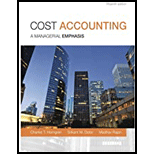
1.
Operating Income:
The outcome after deduction of operating expense and
Operating income.
2.
Opportunity Cost:
Opportunity cost is total of potential income and other benefits that are lost due to rejection of alternatives. These costs are considered to evaluate the multiple project or options available.
Variable Cost:
The variable cost is that cost which varies with increase or decrease in the level of production. The variable cost of per unit remains same. It can be said that variable cost has the positive relationship with output of production.
Fixed Cost:
The fixed cost is that cost which does not change with increase or decrease in the level of the production, but per unit fixed changes with change in the level production. Examples of the fixed cost are rent, wages and insurance.
The amount of relevant cost saved by using released facilities.
Want to see the full answer?
Check out a sample textbook solution
Chapter 11 Solutions
EBK COST ACCOUNTING
- Superior Manufacturing uses a predetermined overhead rate based on direct labor hours to allocate manufacturing overhead to production jobs. For 2024, the company's budget includes estimated manufacturing overhead of $720,000 and estimated direct labor hours of 20,000. In March, the production department completed Job #304, which required $8,200 in direct materials and $4,500 in direct labor (representing 250 hours at $18 per hour). The cost accountant needs to determine the predetermined overhead rate, the manufacturing overhead allocated to Job #304, and the total cost of this job.arrow_forwardHi experts please provide answer this accounting questionarrow_forwardPlease explain this financial accounting problem with accurate financial standards.arrow_forward

 AccountingAccountingISBN:9781337272094Author:WARREN, Carl S., Reeve, James M., Duchac, Jonathan E.Publisher:Cengage Learning,
AccountingAccountingISBN:9781337272094Author:WARREN, Carl S., Reeve, James M., Duchac, Jonathan E.Publisher:Cengage Learning, Accounting Information SystemsAccountingISBN:9781337619202Author:Hall, James A.Publisher:Cengage Learning,
Accounting Information SystemsAccountingISBN:9781337619202Author:Hall, James A.Publisher:Cengage Learning, Horngren's Cost Accounting: A Managerial Emphasis...AccountingISBN:9780134475585Author:Srikant M. Datar, Madhav V. RajanPublisher:PEARSON
Horngren's Cost Accounting: A Managerial Emphasis...AccountingISBN:9780134475585Author:Srikant M. Datar, Madhav V. RajanPublisher:PEARSON Intermediate AccountingAccountingISBN:9781259722660Author:J. David Spiceland, Mark W. Nelson, Wayne M ThomasPublisher:McGraw-Hill Education
Intermediate AccountingAccountingISBN:9781259722660Author:J. David Spiceland, Mark W. Nelson, Wayne M ThomasPublisher:McGraw-Hill Education Financial and Managerial AccountingAccountingISBN:9781259726705Author:John J Wild, Ken W. Shaw, Barbara Chiappetta Fundamental Accounting PrinciplesPublisher:McGraw-Hill Education
Financial and Managerial AccountingAccountingISBN:9781259726705Author:John J Wild, Ken W. Shaw, Barbara Chiappetta Fundamental Accounting PrinciplesPublisher:McGraw-Hill Education





